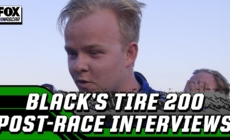-
College basketball’s ‘lawless, cesspool’ transfer portal must be fixed - 28 mins ago
-
How to Watch Mavericks vs. Grizzlies: Live Stream NBA Play-In Tournament, TV Channel - 47 mins ago
-
Martha Stewart joins stars mocking Katy Perry’s Blue Origin spaceflight - 53 mins ago
-
Black’s Tire 200: Tyler Ankrum & Corey Heim post-race interviews | NASCAR on FOX - about 1 hour ago
-
Surfers chased from water by sea lion in Newport Beach - about 1 hour ago
-
Trump Admin Prepared to Recognize Crimea as Russian Territory: Report - about 1 hour ago
-
NASCAR Craftsman Truck Series: Black’s Tire 200 Highlights | NASCAR on FOX - 2 hours ago
-
Porto’s Bakery moving forward in Downtown Disney, replacing Earl of Sandwich - 2 hours ago
-
Kyle Larson Fires Shots at Ty Gibbs For Cup Series Win Drought - 2 hours ago
-
Trump is studying how to remove Fed Chair Jerome Powell, economic adviser says - 2 hours ago
Russia Could Repeat Ukraine Invasion on NATO Countries—War Analysts
Russian Foreign Minister Sergey Lavrov and other senior Russian officials are trying to use Moscow’s colonial past to “justify future aggression against NATO states,” according to a new analysis.
Why It Matters
NATO countries, particularly those within touching distance of Russia, have increasingly said that Moscow could launch attacks against members of the alliance in the coming years.
Officials have suggested that the Kremlin could attack NATO soil using hybrid warfare tactics, rather than launching a more conventional military attack. Hybrid warfare refers to a range of activities stopping short of open fighting, like cyberattacks, information campaigns or the targeting of vulnerable infrastructure, such as undersea cables.
But there are “multiple options for Russia to test the cohesion of the alliance,” including limited land grabs, the now former head of NATO’s Multinational Corps Northeast based in northwest Poland, Lieutenant General Jürgen-Joachim von Sandrart, told Newsweek just before leaving his post in November.
NATO relies on all of its members being committed to Article 5 of the alliance’s founding treaty, which commits other NATO states to help out any member that comes under armed attack, with the response they deem appropriate.
Contributor/Getty Images
What To Know
Russia’s veteran foreign minister, Sergey Lavrov, told Russian newspaper Kommersant in an interview published on Monday that it was “dangerous” when what he described as “fascists” control territory that has “never belonged to anyone except the Russian Empire, the Soviet Union.”
These remarks indicates the Kremlin sees “independent countries once colonized by the Soviet Union and the Russian Empire as rightfully part of modern-day Russia,” the U.S.-based think tank, the Institute for the Study of War (ISW), said in an analysis published on Tuesday.
The think tank noted that Estonia, Latvia and Lithuania—three Baltic countries making up a chunk of NATO’s eastern flank on the Russian border—were part of both the former USSR and the Russian Empire, as well as Moldova, which is in talks to join the European Union.
Finland, one of NATO’s newest members which shares hundreds of miles of land border with Russia, was under Russian Empire control in the 19th century. Large swathes of Poland were part of Russian imperial territory, added the ISW think tank.
Several other prominent Kremlin officials, including Russian President Vladimir Putin and presidential aide Nikolai Patrushev, are “attempting to use Russia’s previous colonization efforts to set informational conditions and justify future aggression against NATO states,” the think tank evaluated.
Estonia’s foreign intelligence service warned in February 2024 that NATO “could face a Soviet-style mass army in the next decade” if Russia successfully reforms its military. Former Russian Defense Minister Sergei Shoigu announced sweeping changes to the military in late 2022.
This army would be “technologically inferior” to NATO forces in areas other than electronic warfare and long-range strikes, the service said, but its “military potential would be significant.”
The Danish Defense Intelligence Service said earlier this year Russia would probably “be more willing to use military force in a regional war against one or more European NATO countries if it perceives NATO as militarily weakened or politically divided.”
In a report released in early February, the intelligence service said it would take Russia roughly five years to be prepared for “a large-scale war on the European continent, where the United States does not get involved.”
Prior to U.S.-brokered talks over a possible ceasefire in Ukraine, Estonian Defense Minister Hanno Pevkur told Newsweek in November that if the fighting stops and Russian soldiers currently bogged down in eastern Ukraine are no longer needed there, “hundreds of thousands of troops” will be available for Putin to use elsewhere.
“So that means that [the] Russian army will have a lot of free force, which will be probably brought to our neighborhood,” Pevkur said.
What People Are Saying
Lavrov told the Russian Kommersant newspaper that “fascists seize lands that never belonged to anyone except the Russian Empire” and the USSR, claiming they “disgusting things there.”
What Happens Next
The Baltic states and Poland are among the NATO nations storming ahead with steep hikes in defense spending taking effect across the alliance, investing in their militaries in attempts to deter Russian attacks.
Source link


























